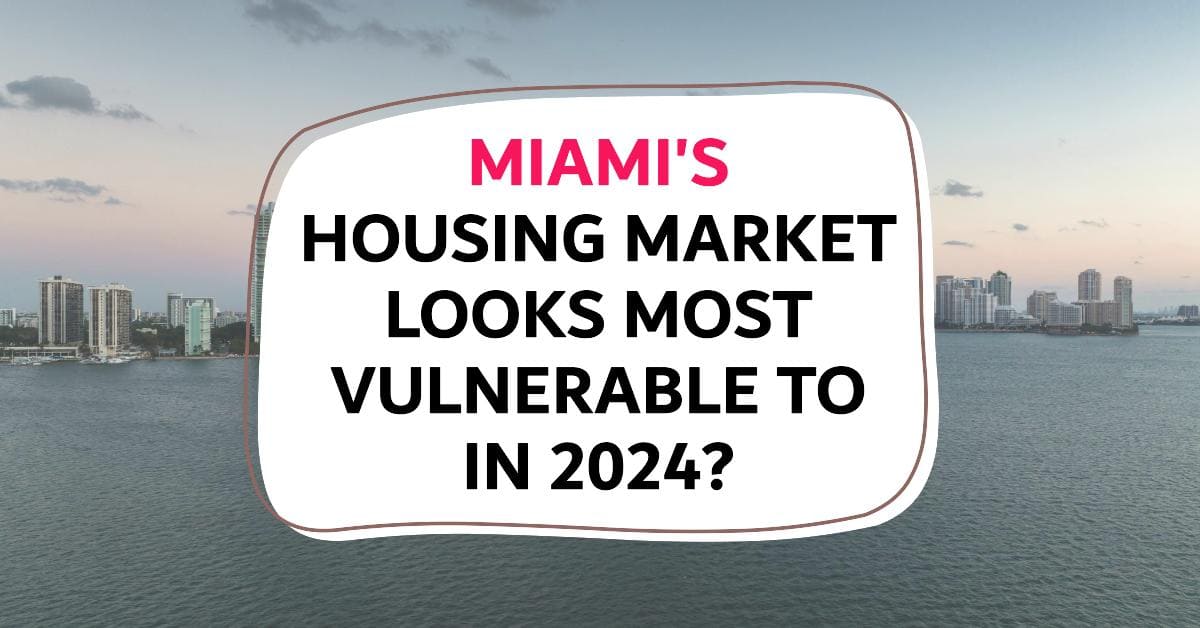Will Miami’s Housing Market Crash Due to Rising Mortgage Rates

The recent surge in mortgage rates has sent shockwaves through the U.S. housing market, marking a pivotal moment for homeowners and prospective buyers alike. According to Freddie Mac, rates surpassed 7% for the first time in 2024, posing concerns for the already strained market. This development comes on the heels of a challenging period, with existing-home sales plummeting to a near-30-year low in 2023 due to escalating costs.
Miami Housing Market Looks Most Vulnerable to Higher Mortgage Rates
While the impact of higher rates is expected to be uneven across different markets, certain areas face heightened vulnerability, particularly those where property prices have surged beyond historical norms. Among these locations, Miami, Florida, stands out as a significant case.
Riley Smith, president of the Riley Smith Group and a seasoned agent in Miami, notes a sense of frustration lingering in the local housing market. While prices for new construction and land remain robust, the condominium market is experiencing a downturn, driven in part by the burden of high mortgage rates.
Smith observes a trend of prospective buyers hitting the brakes, resulting in more deals falling through as both parties feel strained by the current conditions.
Florida’s Rollercoaster Ride
Florida witnessed a remarkable surge in home prices during the COVID-19 pandemic, fueled by an influx of new residents from pricier metropolitan areas and affluent retirees seeking refuge. According to CoreLogic, prices soared by approximately 70% from the onset of the pandemic in 2020 until the end of last year, as reported by the Federal Home Finance Agency.
Despite the overall optimism, concerns loom over the market’s sustainability, especially with the recent surge in supply and the normalization of migration patterns. Regions such as Palm Bay, Deltona, and North Port have been flagged as particularly susceptible to price declines in the coming months, alongside Atlanta and Spokane, Washington.
Changing Dynamics and Future Outlook
The changing landscape of remote work has also played a role in reshaping migration trends, affecting Florida’s housing market. While the state experienced a surge in in-migration during the pandemic, the diminishing appeal of remote work opportunities is dampening the influx of new residents.
Furthermore, concerns over home insurance costs are emerging as a potential deterrent for individuals considering a move to Florida. Builders have noted challenges associated with high insurance expenses, which could further impact demand in the state.
Despite these challenges, it remains premature to declare a weakening demand in Florida. However, certain metros, including Miami, exhibit signs of softer selling trends, as highlighted in recent data from Realtor.com.
Conclusion: Navigating Uncertainty
As Miami braces for a potentially challenging year ahead, industry experts remain cautiously optimistic about the future. While immediate prospects may appear daunting, there is hope for a resurgence in the housing market in the coming years.
For now, stakeholders must navigate through the complexities of fluctuating mortgage rates and shifting market dynamics, adapting their strategies to thrive in an environment marked by uncertainty.
While challenges abound, Miami’s housing market remains resilient, poised to weather the storm and emerge stronger in the long run.
Source:


